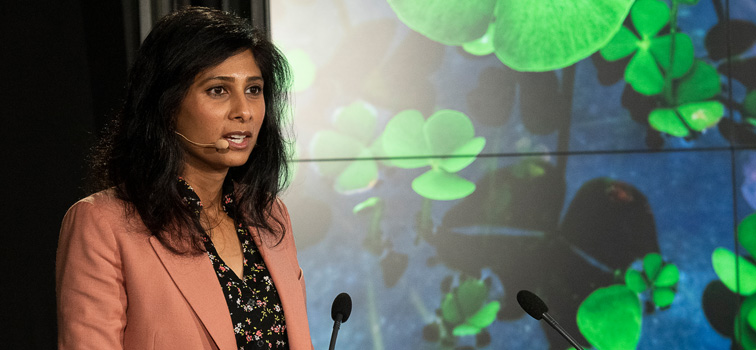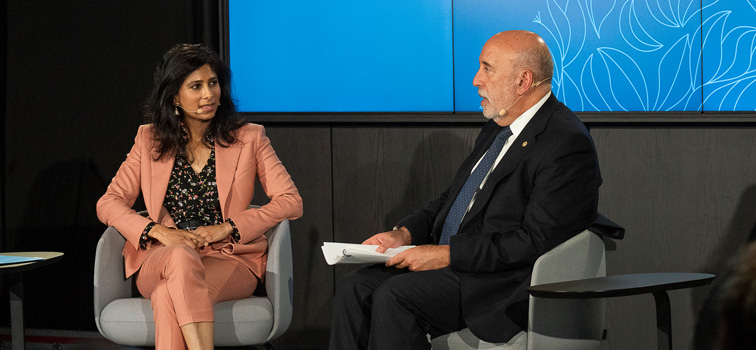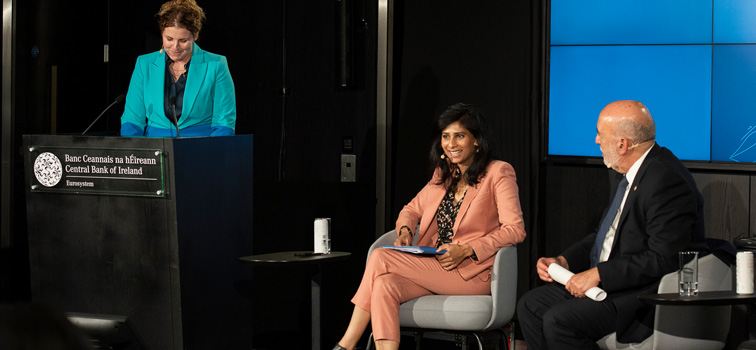Annual Whitaker Lecture – Now is the time for a strategic pivot in fiscal policy

With monetary policy easing and unemployment at low levels in several countries, now is the time for a strategic pivot in fiscal policy.
This was the view expressed by Gita Gopinath, IMF First Deputy Managing Director who delivered the eleventh Whitaker Lecture at Central Bank of Ireland’s Dockland Campus on Wednesday, 19 September 2024.
The annual lecture commemorates TK Whitaker, the influential economist and civil servant who served as Secretary of the Department of Finance from 1956 to 1969 and was Governor of the Central Bank of Ireland from 1969 to 1976.
A strategic pivot in fiscal policy
In her lecture, titled “A Strategic Pivot in Global Fiscal Policy” (PDF 1.84MB) Ms. Gopinath said a strategic pivot in global fiscal policy was critical to ensure that governments have the resources needed to invest in structural transformations including climate change, and to fight the next crisis.
Ms. Gopinth said fiscal risks were increasing against a backdrop where the political discourse has become increasingly favourable to higher government spending.
She said this was accompanied by a decline in political discourse calling for an outright reduction of budget deficits or the limitation of public spending.
According to Ms. Gopinth, this pro-expansion trend had created significant upside risks for the debt outlook.
“While now is a good time to reduce deficits in several countries, governments instead may choose to kick the can down the road,” she said.
Ms. Gopinth explained how political shifts against reducing debt come at a time of big structural shifts that call for greater government spending.
“Countries will need to spend more on climate mitigation and adaptation, on healthcare and on pensions as populations age, and on defence needs as geopolitical tensions rise,” she said.
Consequences of elevated fiscal risks
Ms. Gopinth said elevated fiscal risks were concerning because we are no longer in the era of a global savings glut or of large-scale purchases of government bonds by central banks, both of which drove bonds yields to record lows.
“In the world we are in now, loose fiscal policy can increase term premia on government bonds as long-term debt sustainability comes into question,” she said.
She cited IMF research showing that a significant increase in fiscal policy uncertainty increases private sector borrowing spreads which in turn negatively impacts the economy.
“By driving borrowing costs higher, heightened uncertainty regarding the conduct of fiscal policy can dampen economic activity,” she said.
Growth, guardrails, and grassroots
For advanced economies to reduce deficits and address their growing debts in an economically and politically sustainable manner Ms. Gopinth said they needed to focus on three things: growth, guardrails, and grassroots.
She said higher growth is essential because it improves prosperity and living standards; reduces debt durably; and creates policy space to tackle mounting spending pressures.
She said fiscal adjustments “need to be growth friendly” and called on Europe to raise productivity and stimulate innovation to lift its medium-term growth prospects.
In addition to investing in growth, Ms. Gopinth said it was important to have guardrails to protect against political expediencies and optimism bias.
“Medium term fiscal rules and independent fiscal councils provide such guardrails for fiscal policy. They help reduce fiscal policy uncertainty and strengthen transparency,” she said.
Ms. Gopinth said “the third ingredient of the strategy” calls for a focus on “grassroots” by engaging with civil society and other key stakeholders to help shape the public discourse towards more sustainable fiscal policy.
Conclusion
In her conclusion, Ms. Gopinth reiterated her view that countries need to resist increasing political and structural trends to spend more and borrow more but to start now on a path of gradual fiscal consolidation.
“If history is any guide, the trajectory of debt will be worse than any of us project today, and considerably so. This is not sustainable, and we need to strategically pivot.”

IMF First Deputy Managing Director Gita Gopinath alongside Governor Gabriel Makhlouf at the Central Bank of Ireland’s Whitaker Lecture

First Deputy Managing Director Gita Gopinath alongside Governor Gabriel Makhlouf and Alternate Executive Director at IMF Gina Fitzgerald at the Central Bank of Ireland’s Whitaker Lecture
See also: